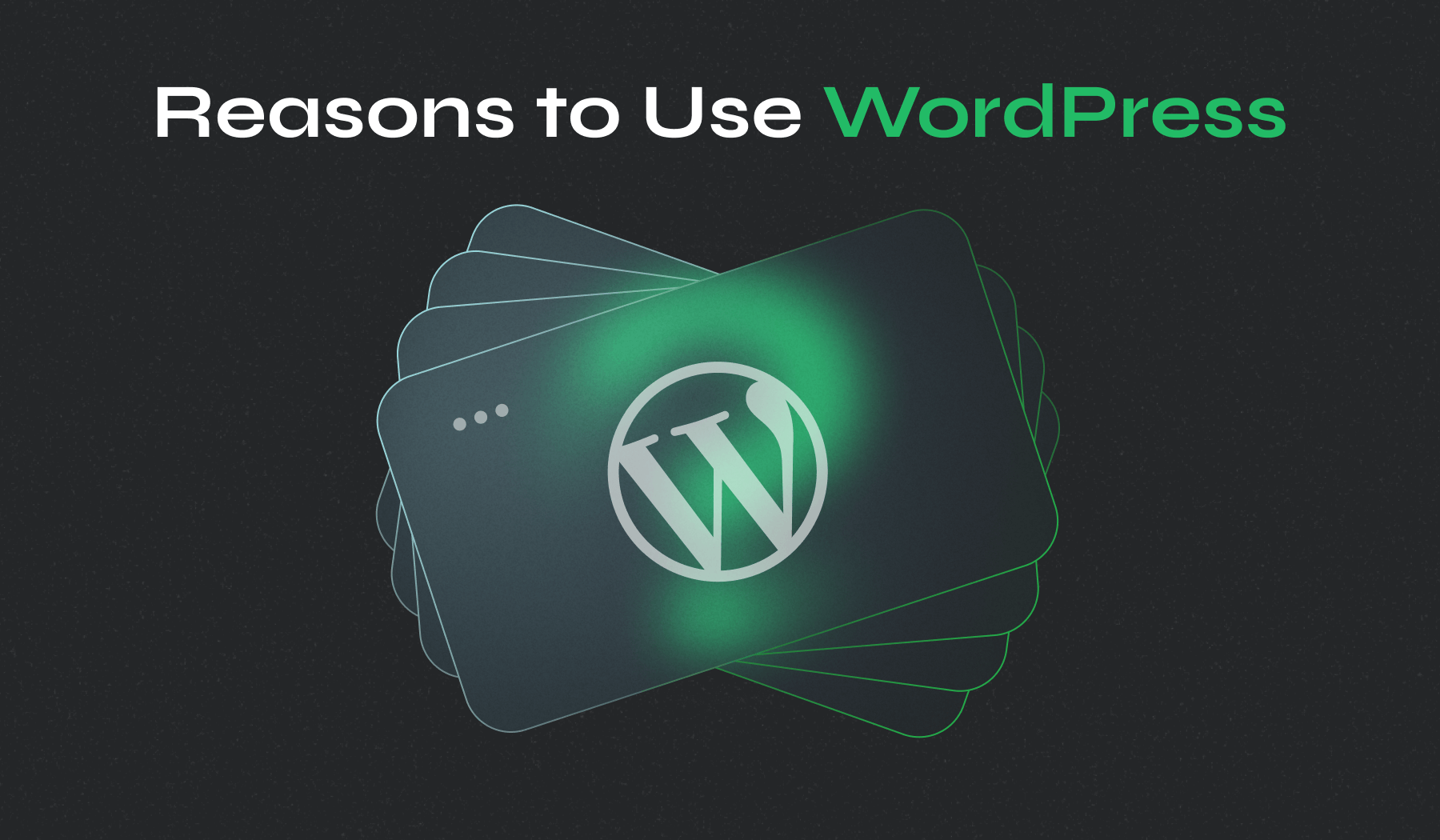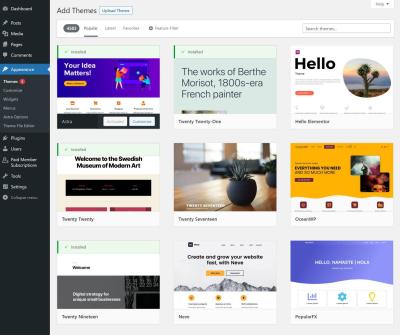Have you ever wondered what makes so many websites, from small blogs to huge online stores, run smoothly? The answer often comes down to one platform: WordPress. Since its launch in 2003, WordPress has grown exponentially, now powering over 40% of all websites on the internet! It’s loved by beginners and experts alike because it’s easy to use, flexible, and incredibly powerful. Whether you’re starting a personal blog, a portfolio, or an e-commerce site,
Key Features That Make WordPress Stand Out

What exactly makes WordPress such a standout platform? Well, it’s packed with features that cater to just about every need. Here are some of the most compelling reasons:
- User-Friendly Interface: Even if you’re not tech-savvy, you’ll find WordPress intuitive. Its dashboard is straightforward, making it easy to create, edit, and manage content without needing to touch a line of code.
- Extensive Plugin Ecosystem: Want to add a contact form, improve SEO, or set up an online store? There’s a plugin for that. With over 50,000 plugins available, you can customize your site’s functionality easily.
- Themes and Customization: Choose from thousands of themes, both free and premium, to give your website a unique look. Many themes are highly customizable, so you can tweak colors, layouts, and fonts to match your brand.
- SEO Friendly: WordPress is built with search engines in mind. It offers plugins like Yoast SEO to optimize your content, making it easier for people to find your site on Google and other search engines.
- Responsive Design: With more people browsing on smartphones and tablets, having a mobile-friendly website is crucial. WordPress themes are responsive, ensuring your site looks great on any device.
- Strong Community Support: Need help? The WordPress community is vast and active. From forums and tutorials to meetups, you’ll find plenty of resources to support your website journey.
All these features come together to create a platform that’s not just powerful but also accessible. Whether you’re a blogger, a business owner, or a developer, WordPress has the tools to bring your vision to life. Its flexibility means you can start simple and grow your website as your needs evolve. That’s why so many consider it the best platform for their website.
3. Ease of Use and User-Friendly Interface
One of the biggest reasons so many people choose WordPress for their websites is how easy it is to get started. Even if you’re not a tech wizard, you can quickly learn how to manage your site without feeling overwhelmed. The interface is intuitive, designed with beginners in mind, so you can focus on creating great content instead of wrestling with complicated tools.
When you log into your WordPress dashboard, you’ll see a clean, straightforward layout. Adding a new post? It’s as simple as clicking “Add New” under the Posts menu. Want to upload images or videos? Just click the “Add Media” button, and you’re all set. Everything is organized logically, so you always know where to find what you need.
Plus, WordPress offers helpful features like:
- WYSIWYG Editor: What You See Is What You Get editor makes formatting your content easy—no special coding skills needed.
- Drag-and-Drop Page Builders: With plugins like Elementor or Beaver Builder, you can design pages visually, dragging elements into place without touching a line of code.
- Media Management: Upload, organize, and insert images, videos, and audio files seamlessly.
And if you ever get stuck, there’s a vibrant community of users and countless tutorials online. Whether you’re updating your website, installing new plugins, or just customizing your site, WordPress keeps the process simple and accessible. This ease of use makes it an ideal platform for small business owners, bloggers, and anyone wanting to maintain their site without needing a full-time developer.
4. Extensive Customization Options and Themes
Another huge perk of WordPress is how flexible it is when it comes to customizing your website’s look and feel. Whether you want a sleek, professional appearance or a fun, quirky vibe, there are thousands of themes and plugins that can help you achieve exactly that.
At its core, WordPress offers a wide variety of free themes in its repository, covering everything from business websites to personal blogs. Want something more unique? You can purchase premium themes from marketplaces like ThemeForest or Elegant Themes, which often come with advanced features and dedicated support.
Customizing your site is as simple as choosing a theme and then tweaking it to match your brand. Most themes come with options to change colors, fonts, layouts, and more—often through user-friendly customization panels. If you have a specific vision, you can even modify the code or hire a developer to create a custom theme just for you.
Beyond themes, WordPress’s vast plugin ecosystem gives you the power to add functionalities like:
| Functionality | Examples |
|---|---|
| SEO Optimization | Yoast SEO, All in One SEO Pack |
| Contact Forms | Contact Form 7, WPForms |
| Security | Wordfence, Sucuri Security |
| eCommerce | WooCommerce, Easy Digital Downloads |
All these options mean you can tailor your website precisely to your needs—without starting from scratch or hiring a developer for every tweak. This level of customization ensures your site not only looks great but functions perfectly for your audience and business goals.
5. Wide Range of Plugins for Enhanced Functionality
One of the standout features that makes WordPress such a popular choice is its extensive library of plugins. Think of plugins as the apps of your website—they add specific features and functionalities without you having to build everything from scratch. Whether you want to improve security, add contact forms, optimize images, or set up an online store, there’s likely a plugin that can do the job.
What’s really impressive is the variety and quality of these plugins. There are over 50,000 free plugins available in the official WordPress Plugin Directory alone, covering almost every imaginable need. And if you’re looking for more advanced features, premium plugins provide even more options and support.
Here are some popular plugin categories that can truly enhance your website:
- SEO Optimization: Plugins like Yoast SEO or All in One SEO help you optimize your content for search engines, making it easier for your audience to find you.
- Security: Plugins such as Wordfence or Sucuri Security protect your site from malware and hacking attempts.
- Performance: Caching plugins like WP Rocket or W3 Total Cache speed up your site, providing a better experience for visitors.
- Social Media Integration: Plugins that add social sharing buttons or auto-post your content to social platforms.
- E-Commerce: WooCommerce is a game-changer if you want to sell products online seamlessly.
Installing and managing plugins is straightforward, thanks to the user-friendly dashboard. Just a few clicks, and you’re ready to customize your site’s functionality. Plus, most plugins are regularly updated, ensuring compatibility and security.
Of course, it’s important to be selective—adding too many plugins can slow down your site or cause conflicts. But with the right choices, plugins empower you to create a feature-rich website tailored exactly to your needs, without the need for extensive coding knowledge.
6. SEO-Friendly Architecture for Better Search Rankings
Getting your website to rank well on search engines is essential, and WordPress makes this easier thanks to its inherently SEO-friendly architecture. From the ground up, WordPress is built with clean, semantic code, which search engines love because it makes understanding your content straightforward.
Beyond its clean code, WordPress provides a solid foundation for SEO optimization with features like customizable permalinks, which allow you to create URL structures that are both user-friendly and keyword-rich. For example, instead of a generic URL, you can have yourwebsite.com/seo-tips—making it clear what the page is about.
Additionally, WordPress automatically generates sitemaps, which are vital for search engines to crawl your site efficiently. You can also customize meta titles and descriptions for each page or post, helping you control how your content appears in search results.
What really boosts your SEO efforts are plugins like Yoast SEO or All in One SEO Pack. These tools guide you through optimizing each piece of content, from keyword usage to readability analysis. They also help you manage technical SEO factors, such as canonical URLs, breadcrumbs, and schema markup, which enhance your site’s visibility and click-through rates.
Another advantage is the mobile responsiveness of many themes and plugins, ensuring your site looks great and functions well on all devices. Google favors mobile-friendly sites, so this is a big plus.
Finally, WordPress’s community and support ecosystem mean you’re never alone in your SEO journey. Whether it’s tutorials, forums, or expert advice, there’s plenty of help available to keep your site ranking higher and reaching more people.
In short, WordPress’s architecture and the right SEO tools make it easier than ever to improve your search rankings and attract organic traffic—key ingredients for online success.
7. Strong Community Support and Regular Updates
One of the coolest things about choosing WordPress as your website platform is the vibrant community behind it. Whether you’re a newbie or a seasoned developer, there’s a vast network of users, developers, and enthusiasts ready to lend a hand, share ideas, or troubleshoot issues. This community support means you’re never truly alone when building or managing your site. Need help customizing a plugin? Looking for advice on best practices? Just hop onto forums, social media groups, or even attend local WordPress meetups, and you’ll find plenty of friendly folks eager to help.
But community support isn’t just about peer assistance — it also ensures that WordPress keeps evolving. The platform receives regular updates, which include security patches, bug fixes, and new features. These updates are crucial because they help protect your site from vulnerabilities and keep it running smoothly. Plus, updates are straightforward to install, often just a few clicks away, making website maintenance less stressful.
Developers constantly work on improving WordPress, releasing updates about every 4-6 weeks on average. This consistent rhythm means your website stays current with the latest web standards, security protocols, and design trends. And because so many developers contribute, the ecosystem of themes and plugins is continually expanding, giving you more options to customize your site exactly how you want.
In short, the active community and consistent updates give you peace of mind. You’re part of a thriving ecosystem that prioritizes security, innovation, and support, ensuring your website remains robust, secure, and up-to-date for years to come.
8. Cost-Effective Solution for All Types of Websites
When it comes to building a website, budget is often a big concern. The good news is, WordPress is incredibly cost-effective, making it accessible for everyone — from small business owners and bloggers to large organizations. The core platform itself is open-source and free to download and use. That means you can get started without shelling out big bucks upfront.
Of course, there might be some costs involved, such as purchasing a domain name, hosting, and optional premium themes or plugins. But even then, these expenses tend to be affordable and scalable based on your needs. For example, shared hosting plans, which are great for beginners, often run at just a few dollars a month. As your website grows, you can upgrade to more powerful hosting options without breaking the bank.
Here’s a quick breakdown of typical costs:
- Domain Name: $10 – $15 per year
- Hosting: $3 – $30+ per month, depending on your provider and plan
- Themes & Plugins: Many free options available; premium ones typically cost $50 – $100 each
- Development & Maintenance: Can be DIY or outsourced, with costs varying widely
What’s really great is that WordPress caters to all types of websites—whether you’re starting a simple blog, an online store, a portfolio, or a large-scale enterprise site. Its flexible architecture allows you to add features as needed, so you don’t have to pay for unnecessary extras upfront. Plus, the abundance of free resources and tutorials helps you learn how to set up and manage your site without hiring expensive developers.
In essence, WordPress offers a powerful, scalable, and budget-friendly platform that grows with your vision. You can start small and expand your website over time, all while keeping costs manageable. That’s a huge advantage in today’s digital world, where having an online presence is essential but budget constraints are common.
9. Security Measures and Best Practices for WordPress Sites
When it comes to running a website, security is always at the top of the list. Thankfully, WordPress has a strong reputation for being secure — but only if you take the right steps to protect your site. Think of it like locking your doors and windows; it’s about being proactive rather than reactive.
First off, always keep your WordPress core, themes, and plugins updated. Developers regularly release updates that patch vulnerabilities and improve security. Ignoring these updates leaves your site open to potential threats. Setting your site to auto-update is a smart move, especially if you’re not tech-savvy.
Next, choose reputable plugins and themes. Not all are created equal, and some can be riddled with security flaws. Stick with well-reviewed, regularly maintained options from trusted sources. Before installing anything new, do a quick check on its ratings and update history.
Another key step is installing a reliable security plugin. Popular choices like Wordfence, Sucuri, or iThemes Security offer features like firewalls, malware scanning, and login attempt monitoring. These tools act like a security guard, constantly watching for suspicious activity.
Implement strong, unique passwords for your admin accounts, database, and hosting accounts. Better yet, use a password manager to generate and store complex passwords. Enabling two-factor authentication (2FA) adds an extra layer of defense, making it harder for hackers to gain access.
Regular backups are your safety net. In case of an attack or accidental data loss, having recent backups means you can restore your site quickly without much hassle. Use plugins like UpdraftPlus or BackupBuddy, and store backups in secure off-site locations like cloud storage services.
| Security Best Practices | Description |
|---|---|
| Keep Everything Updated | Regularly update WordPress core, themes, and plugins to patch vulnerabilities. |
| Use Reputable Plugins & Themes | Install from trusted sources, check reviews, and maintain them properly. |
| Install Security Plugins | Implement tools like Wordfence or Sucuri for real-time protection. |
| Strong Passwords & 2FA | Use complex passwords and enable two-factor authentication for extra security. |
| Regular Backups | Schedule frequent backups and store them securely off-site. |
Lastly, always stay informed about the latest security trends and threats. The online landscape evolves quickly, and keeping yourself educated helps you stay one step ahead of potential risks. With these best practices, your WordPress site can be a fortress — safe, secure, and ready to grow with your business or personal project.
10. Conclusion: Why WordPress Is the Ideal Choice for Your Website Development
So, after exploring all these facets — from ease of use and flexibility to security and scalability — it’s clear why WordPress stands out as the best platform for your website. Whether you’re a beginner or an experienced developer, WordPress offers a perfect balance of power and simplicity that makes building and maintaining a website enjoyable.
One of the biggest advantages is its user-friendly interface. You don’t need to be a coding wizard to create beautiful pages or manage content. The visual editor makes it simple to drag and drop elements, customize layouts, and see your changes in real time.
Plus, the vast ecosystem of themes and plugins means you can tailor your site exactly how you want it. Want an online store? There are fantastic eCommerce plugins like WooCommerce. Looking for a portfolio? Plenty of sleek themes are available. Need SEO tools? WordPress has you covered with plugins like Yoast SEO.
Scalability is another big plus. WordPress can handle small blogs and large enterprise websites alike. As your needs grow, so can your site — just add more features or upgrade your hosting plan. And with numerous hosting providers optimized for WordPress, setup is quick and straightforward.
Security, as we discussed, is robust when you follow best practices. The active community of developers also means vulnerabilities are quickly identified and patched. Plus, there’s a wealth of tutorials, support forums, and professional developers ready to help if needed.
In a nutshell, choosing WordPress means choosing a platform that’s flexible, secure, and supported by a thriving community. It empowers you to create a professional, functional website without breaking the bank or feeling overwhelmed. Whether you’re starting a blog, building an online store, or creating a portfolio, WordPress is truly the ideal choice for your website development journey.


